

Most ebook files are in PDF format, so you can easily read them using various software such as Foxit Reader or directly on the Google Chrome browser.
Some ebook files are released by publishers in other formats such as .awz, .mobi, .epub, .fb2, etc. You may need to install specific software to read these formats on mobile/PC, such as Calibre.
Please read the tutorial at this link. https://ebooknice.com/page/post?id=faq
We offer FREE conversion to the popular formats you request; however, this may take some time. Therefore, right after payment, please email us, and we will try to provide the service as quickly as possible.
For some exceptional file formats or broken links (if any), please refrain from opening any disputes. Instead, email us first, and we will try to assist within a maximum of 6 hours.
EbookNice Team

Status:
Available4.4
28 reviews
ISBN 10: 1400860237
ISBN 13: 9781400860234
Author: Nancy Joan Weiss
Whitney M. Young, Jr., the charismatic executive director of the National Urban League from 1961 to 1971, bridged the worlds of race and power. The "inside man" of the black revolution, he served as interpreter between black America and the businessmen, foundation executives, and public officials who constituted the white power structure. In this stimulating biography, Nancy J. Weiss shows how Young accomplished what Jesse Jackson called the toughest job in the black movement: selling civil rights to the nation's most powerful whites. With race at center stage in American national politics, Young brought the National Urban League into the civil rights movement and made it a force in the major events and debates of the decade. Within the civil rights leadership, he played an important role as strategist and mediator. A black man who grew up in a middle class family in the segregated South, Young spent most of his adult life in the white world, transcending barriers of race, wealth, and social standing to advance the welfare of black Americans. His goals were to gain access for blacks to good jobs, education, housing, health care, and social services; his tactics were reason, persuasion, and negotiation. He understood keenly the value to the movement of creative tension between moderates and militants, and he took good advantage of that understanding to promote his aims. Andrew Young said of Whitney Young that he knew the "high art of how to get power from the powerful and share it with the powerless." How he managed that, and with what consequence, is the central theme of this book. Originally published in 1990. The Princeton Legacy Library uses the latest print-on-demand technology to again make available previously out-of-print books from the distinguished backlist of Princeton University Press. These editions preserve the original texts of these important books while presenting them in durable paperback and hardcover editions. The goal of the Princeton Legacy Library is to vastly increase access to the rich scholarly heritage found in the thousands of books published by Princeton University Press since its founding in 1905.
I. Growing Up at Lincoln Institute
II. Kentucky State
III. World War II
IV. St. Paul and Omaha: Early Years in the Urban League
V. Atlanta: Social Work and Civil Rights
VI. A Year Off and a New Job
VII. Leader of the National Urban League
VIII. The Civil Rights Movement
IX. The Corporate Establishment
X. The Kennedy and Johnson Administrations
XI. The Strains of Celebrity
XII. Rlack Power
XIII. The Nixon Administration
XIV. Doubts, Pressures, Prospects for the Future
XV. Lagos
whitney m. young jr. and the struggle for civil rights
facts about whitney m young jr
whitney young jr facts
5 facts about whitney young
whitney m young jr quotes
whitney young primary sources
Tags: Nancy Joan Weiss, Struggle, Rights